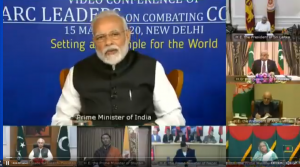The completion of the first year of the Modi government’s second term in office in India presents a good opportunity to take stock of its successes and failures on the foreign policy front. One of the notable successes of this government has been in its outreach to India’s neighborhood, which began with Modi’s visit to the Maldives and Sri Lanka soon after taking office for his second term.
The Maldives was very important since it seemed to be veering toward China in the time leading up to the 2018 election of the new president, Ibrahim Mohamed Solih. Also in June 2019, Modi attended the Shanghai Cooperation Organization Summit in Bishkek, Kyrgyzstan.
Another of the highlights of the first year of Modi’s second term is in India’s ties with the United States, with Modi concluding a highly successful visit there in September last year. This was followed by the visit of U.S. President Donald Trump to India in February this year.
Another notable success has been in the government’s engagement of the Indian diaspora in different parts of the world.
The biggest challenge for the Indian government no doubt has been the outbreak of the coronavirus pandemic. In the light of the pandemic, the Indian government has launched the Vande Bharat Mission, to evacuate Indians stranded in different parts of the world. Already 45,000 people have been repatriated to India (as of this writing), while more than 300,000 people have expressed their desire to be repatriated.
India’s abrogation of Article 370 of its constitution and the removal of the special status of the disputed border state of Jammu and Kashmir also brought a big challenge, as the foreign policy establishment had a lot of explaining to do to the international community as a whole.
The government also had a lot of explaining to do on the Citizenship Amendment Bill (CAB) — especially to countries like Bangladesh. The bill provides a path to citizenship for persecuted religious minorities from Pakistan, Afghanistan, and Bangladesh, thus making a judgment about human rights in those countries. Relations between India and Bangladesh had warmed under the Sheikh Hasina government, but this issue has put a spanner in the works.
Relations with China also remain a major challenge as seen in the recent incursions from the Chinese side in the Ladakh and Sikkim sectors along the border between the two countries. In addition, India suffers from a huge deficit in its trade with China and it will have to take urgent steps to address this trade balance. Last year, the Indian trade deficit stood at $56.77 billion.
The Pakistan conundrum continues for New Delhi. There has been no let-up in the incidents of terror emanating from Pakistan. The Indian government has refused to enter into talks with Pakistan unless and until Islamabad completely stops exporting terror to India.
The road ahead for the Modi government in the foreign policy realm is mired with challenges, especially in the light of the coronavirus pandemic. Though the number of fatalities in India has been relatively low, the number of cases has shot up recently.
This presents a big worry for the government, as the economy has also suffered. It will be a huge challenge to revive the economy. New Delhi will need to cooperate with other countries in order to surpass over this crisis.
The neighborhood seems likely to be the biggest challenge for New Delhi in the times ahead if it is to achieve its goal of being a great power. In addition, dealing with the China challenge will be key for India in the years ahead. With regards to Pakistan, India will have to think of innovative ways to tackle the threat from that country, as it has refused to budge from its stand of exporting terror to India.
It also seems that New Delhi will get a lot closer to the United States than in the earlier times, since the threat from China shows few signs of diminishing. Trump has already advocated that India should be included along with other countries in the G-7 to make it the G-11, in the meantime.
All said and done, while the first year in the foreign policy domain in Modi’s second term has been a very eventful one, the next year comes with a series of challenges — especially in the wake of the coronavirus outbreak.
Rupakjyoti Borah is a Senior Research Fellow with the Japan Forum for Strategic Studies, Tokyo. The views expressed are personal. Twitter @rupakj.

































